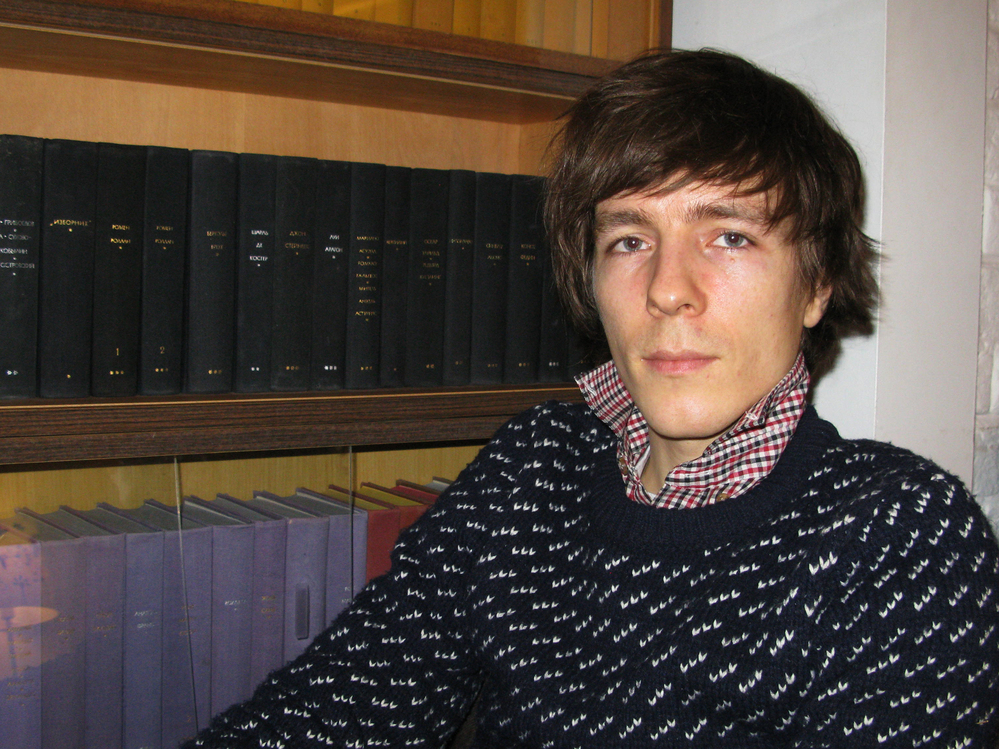Tsiferblat, or Clockface Cafe, in Moscow draws a young crowd, from students to entrepreneurs. The cafe provides Wi-Fi, printers, books and art supplies. Drinks, snacks, atmosphere and the space are free. All customers pay for is time.
Cafe life has taken hold in modern Russia. From Starbucks to local chains such as Kofe Khaus and Schokoladnitsia, there are lots of places to hang out, see and be seen.
It's a striking change in a country where, in Soviet times, the best an ordinary comrade could expect was a mug of tea in a workers canteen.
The world over, the basic contract between cafe and customer is this: You buy a drink or a snack, and you get to use the premises for as long as it takes to consume it.
But an entrepreneur in Russia is experimenting with ways to change that: At his cafes, money buys time. And everything else is free.
Welcome to Tsiferblat in Moscow. It's one of two in the city, and in English, it would be known as the Clockface Cafe.
When you enter, Polina Poliakova leads you to a cabinet filled with defunct alarm clocks. "When you come to Tsiferblat, first what you should do is take the clock," she says, explaining what she calls "the ritual."
So you choose a sturdy Soviet model and Poliakova notes your time of arrival.
The clock doesn't actually work â€" it just serves as a marker for your table and a reminder that you are now "on the clock."
A Multipurpose Space
Clockface is the brainchild of Ivan Meetin, a 28-year-old who got started in the business by experimenting with a cafe that ran solely on donations.
Clockface is different, he says. "You don't have to pay for coffee or tea or cookies," Meetin says. "You should pay for time, and time costs â€" I hope â€" [are] not that expensive."
By Moscow standards, it's not.
Ivan Meetin, 28, has opened nine Clockface Cafes in Russia and Ukraine. He calls his entrepreneurial experiment "the social network in real life."
Ivan Meetin, 28, has opened nine Clockface Cafes in Russia and Ukraine. He calls his entrepreneurial experiment "the social network in real life."
Corey Flintoff/NPRYou pay two rubles a minute for the first hour â€" slightly less than $4 an hour â€" and then one ruble per minute for the time beyond that. Any time after five hours is free â€" so you can never spend more than about $12 per person.
Clockface is much larger and busier than it looks from the outside.
The clientele â€" which seems to range in age between about 18 and 30 â€" includes students in study groups and business people who crowd around a table that's bristling with computer screens.
Poliakova leads the way through seven good-sized rooms, all decorated with homey furniture, stopping to point out with pride the espresso machine.
"We have cappuccino, latte, espresso, Americano, and our coffee is not the cheap one," Meetin says with pride, adding that Clockface has its own coffee-roasting operation in the Moscow suburbs.
He says customers can bring their own food, too, so many people use the space for parties and birthdays, as well as lectures and classes. You can bring anything, he says, except for alcohol and drugs, and there's no smoking.
'The Social Network In Real Life'
Clockface provides space for classes and events, board games, books and newspapers â€" even art supplies such as paper, pencils and brushes for the drawing club that meets on Tuesdays. In fact, Meetin says that for him, the cafe is more of an educational or artistic project than a business. "Sometimes I call it the social network in the real life," he says. "I want people to communicate."
And in that sense, Meetin's idea is a throwback to what people did before there were social media â€" he may have just figured out a different way to make it pay.
He has nine cafes up and running: seven in Russia and two in Ukraine.
He already has plenty of competition in Russia, from people who have taken the pay-by-the-minute cafe idea and tried to give it wider appeal by providing pop music and video games. Meetin calls that "killing time."
Before he got into the cafe business, Meetin says, he tried his hand at theater, art, music and literature. He had some success, too: One of his novels was short-listed for a Russian literary award, the Debut Prize, but he says he realized that he is "not genius."
But he also decided that he wanted to do something on the level of genius, to be as good at something of his own as his childhood favorite, Charlie Chaplin, was at comedy.
"It's not Charlie Chaplin, of course," he says about the cafe. "But somehow, it's a good thing, and I can say that I am satisfied with it."
Meetin is thinking of opening his next Clockface in London.





